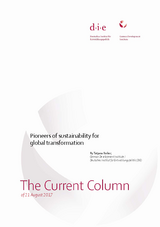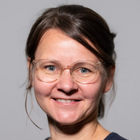Pioneers of sustainability for global transformation
Reiber,TatjanaThe Current Column (2017)
Bonn: German Development Institute / Deutsches Institut für Entwicklungspolitik (DIE) (The Current Column of 21 August 2017)
Bonn, 21 Augsut 2017. With climate change, global inequality and more than 65 million people fleeing their homes, our world is not in a good state. If we are to solve these and other complex problems, then we will need to make many fun-damental changes. Keeping global warming below two degrees Celsius, for instance, requires that we make a radical move away from using fossil fuel energy sources. This kind of global transformation needs pioneers of sustainability to develop solutions for dealing with global problems and implement them in practice. Through their actions, these role models show that change is possible and demonstrate how it can be achieved. Take the development of the Fairphone, for example, which illustrates how global production processes can be designed to secure fair incomes, protect the environment and avoid exacerbating resource conflict. Today sees the first day of this year’s Managing Global Governance (MGG) Academy at the German Development Institute / Deutsches Institut für Entwicklungspolitik (DIE). The Academy aims to promote future pioneers of sustainability. Participants come from six rising powers (Brazil, China, India, Indonesia, Mexico and South Africa), Germany and Hungary. They work in government institutions, research organisations, civil society and the private sector and have expertise in many fields, including anti-corruption, water management and human rights. This diversity is welcome; their different perspectives give rise to experience sharing and discussion, but also irritation. When it comes to the question of whether environmental and social standards are useful or not, an Indian economist at a research institution may see the issue very differently to a German geographer working for a non-governmental organisation. Given the growing role of rising powers in addressing global challenges, the MGG Academy primarily seeks to attract young leaders from these countries and from European nations. The underlying assumption is that building trust and developing a common perception of problems and solutions are key to the success of international cooperation. The MGG Academy is based on a model of transformative education, whereby participants are supported not only in understanding and analysing complex problems, but also in taking meaningful action. What competences do pioneers of sustainability need? Systemic thinking is important in order to identify and address the interlinkages between different dimensions of global challenges, and find solutions to those challenges. Things which are good for environmental conservation, such as nature reserves, pose a problem when indigenous peoples are driven from their land. It is necessary to break out of a disciplinary silo mentality, but also to consider the perspectives of different stakeholders and involve them in the process of analysing issues and developing solutions. The diverse mix of course participants and lecturers facilitates this process. Excursions, discussions and practical experience also promote systemic thinking. These include a visit to a brown coal mine, discussion with residents of a multigenerational house and participation in a Critical Mass bicycle protest ride. Reflective and normative competences are also important. Transformation is radical, far-reaching change that is both material and non-material, visible and invisible in nature. In other words, it is about changes in world view, culture and attitude and about questioning habits and thought patterns. For the MGG Academy specifically, this means that participants start by looking at themselves and asking questions such as: what drives me in life? What values are important to me? How have I lived my life so far and in what areas would I like to change? Strategic abilities are also fundamental - how can I develop plans for positive change, how do I overcome obstacles and how can I bring different actors together? When participants develop a strategy for using Jakarta’s waterways to transport goods, they also discuss which partners should be brought on board to implement the idea. Ultimately, personal competences are fundamental. Knowledge and ideas will only lead to change if they are compellingly communicated. Those who wish to find robust solutions must be capable of listening to others. It is all about team work and calling upon a range of experience. The small group processes of the MGG Academy are sometimes strenuous. The topic is complex, time is short and the team is diverse. However, being able to resolve conflicts makes the long search processes worth it in the end. Participants of the MGG Academy 2016 pledged to one another that they would make practical contributions to sustainable development. They called this pledge “22 small steps towards implementing the 2030 Agenda”. Find out more about the MGG Academy...


